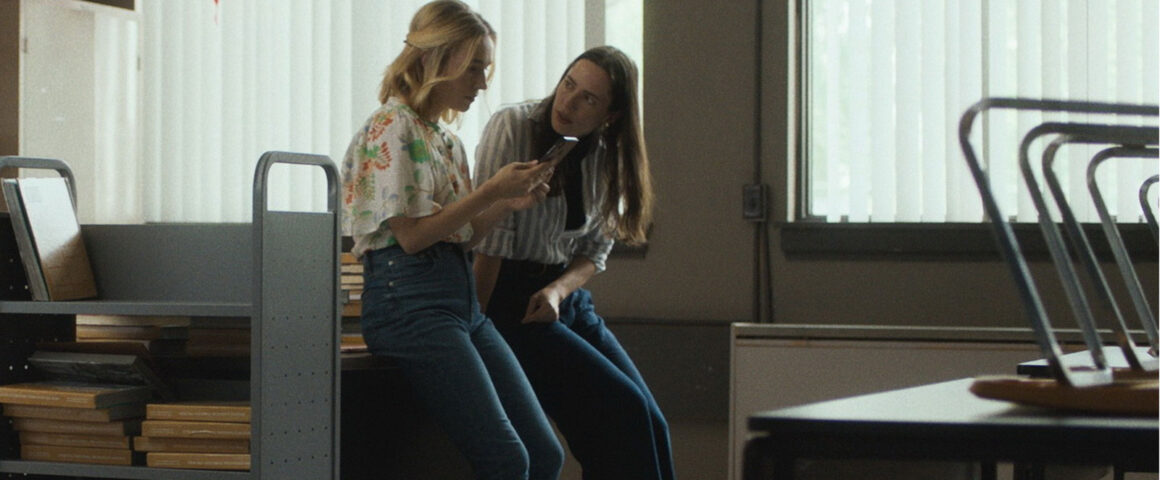A lone woman wakes at night in her expansive house and explores the strange noises that awoke her. The space, familiar and comforting in the day, is cloaked in shadows that sometimes seem to move of their own volition. As the woman searches, shapes shift behind her, until something prompts a sudden jump . . .
This description could apply to many a haunted house film, from “The Innocents” to “The Others” to “The Awakening.” The Night House offers genre tropes familiar to fans of those films, but also throws in some unexpected features. Beginning with slow panning shots of an opulent and very modern house by a lake, we quickly learn that this is the home of Beth (Rebecca Hall, “Godzilla vs. Kong”), recently widowed after her husband Owen (Evan Jonigkeit, “Brave New Jersey”), an architect who also designed the house, shot himself without warning. Beth is dealing with her grief both at home and in her work as a high school teacher, when she is further disquieted by a mysterious presence in her house. Is the presence the product of her bereaved and confused mind, or is there something supernatural at work?
While the film is a bit disjointed initially, director David Bruckner uses this disjointing to unsettle the viewer, as mysterious images and dreams during the first act seem to clarify that this is indeed a haunting. More often than not, films of this type maintain ambiguity until the finale as to whether the events are psychological or supernatural. In this case, however, the question appears to be answered relatively early, but as Beth learns more about Owen, the mystery deepens and other horror tropes creep in with increasingly crawly effect. Reversed images, the sight of Owen standing naked on the water, a palatable sense of malevolence and a secret life all disrupt any sense of certainty. Most significantly, we learn of Beth’s own past trauma, not directly associated with Owen’s suicide but a life-shaping event in its own right.
In her matter-of-fact and often quite aggressive response to the threatening mysteries that she encounters, Beth is more interesting and varied than the standard gothic heroine. There is no running around in a nightie and coming over all tremulous here. At times, she is more reminiscent of a slasher final girl, apt to call out her non-corporeal visitor with a bottle of brandy to hand or head out into the woods with a powerful flashlight. Her investigation becomes obsessive but remains understandable, as she flicks through Owen’s phone and computer, follows his purchase trails to rare bookstores and confronts friends and new acquaintances with similar resolve.
Onscreen throughout most of the film, Hall commands the screen with great presence. Her luminous eyes convey pain and anger in equal measure, especially in a crucial scene when the camera eases behind her, crossing the 180-degree line as the film itself takes a significant turn. She is ably supported by the rest of the cast, especially co-worker Claire (Sarah Goldberg, “Izzy Gets the F*ck Across Town”), the best friend we should all be so lucky to have, as well as her neighbor Mel (Vondie Curtis-Hall, “Breaking Brooklyn”) who offers advice both useful and patronizing. In his brief appearances as Owen, Jonigkeit displays a touching innocence, while still hinting at something below the surface.
If you’ll pardon the cliché, the house is also a wonderful supporting character. Production designer Kathrin Eder makes this modern structure both efficient with clean lines, while also being warm and inviting. Thus, when the very building becomes untrustworthy it is all the more unsettling. Figures in the architecture take form and just as quickly disappear, creating some intense set pieces and startling jump scares. The director of photography, Elisha Christian, lenses the daytime sequences in warm light while at night the shadows take on multiple dimensions, suggesting both familiar and unfamiliar darkness. Beth’s discovery of another house, that of the title, extends the central conceit of haunting and trauma manifesting physically through structures, with further revelations to be found. The final sequence is quite literally gut wrenching, but it is notable that the film is also deeply sad. Like many a tale of haunting, The Night House covers the five stages of grief, with Beth demonstrating fear, anger, denial, bargaining and acceptance. This is possibly by rote and the viewer may find themselves anticipating the next stage, but the film also probes the compelling question of mortality. What do we believe happens after we die? Is it more or less comforting to believe that there is something after death, or nothing? The Night House uses these questions to great effect, and while the finale may be a little rushed, it remains an eerie investigation that lingers in the mind like echoes of a near death experience . . .



